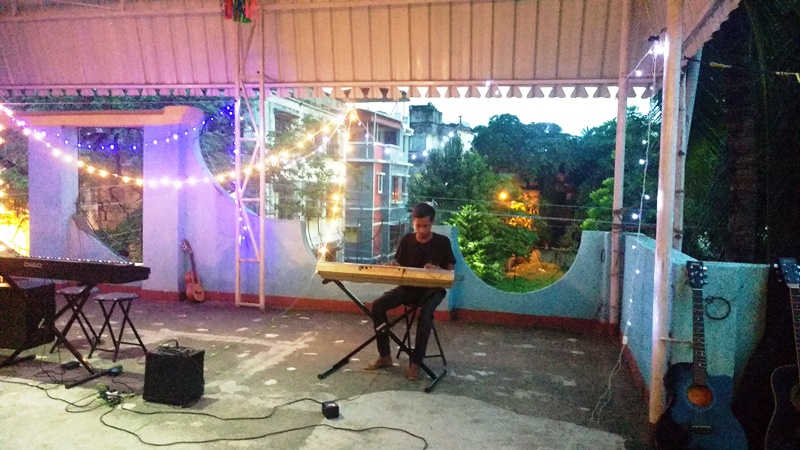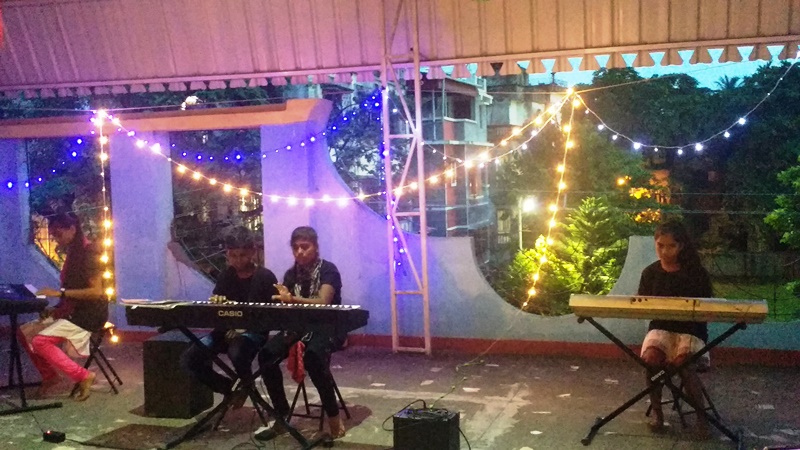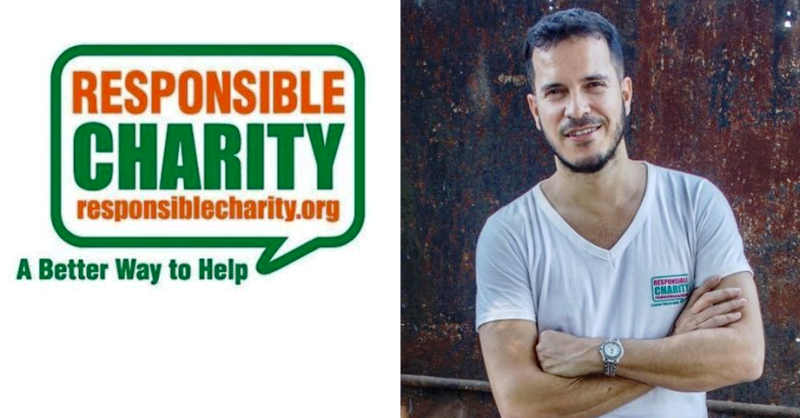Last week, I found myself in a South Kolkata neighborhood that seemed entirely invested in its Sunday afternoon siesta. The narrow lanes led to a small field, managed by the local club. Apart from a few young boys lazily strolling around on the wet grass, there was no one else. Even the rickshaw pullers looked lethargic; one of them had propped himself up on his rickshaw seat in an awkward position, and was fast asleep.
According to Google Maps, I had reached the office of Responsible Charity, an NGO founded by Hemley Gonzalez. I found him inside one of the rooms, bustling around to make sure everything was set for Slum Jam- a monthly musical event organized by the NGO where underprivileged children (who have been trained for over a year) and local artists perform. Hemley invited me up to the terrace which had been decked up for this evening. Children from the slums of Park Circus, Kolkata, sat beaming in front of their keyboards , discussing excitedly who would perform first.
Soon, we were all asked to take a seat. The children performed their pieces one after the other and won over everyone’s hearts. It was heartwarming to see them play renditions of Yiruma and Beethoven with such ease and with the brightest grins on their faces. It made me realize how something as elementary as music is also a luxury that many don’t have. I was glad that these kids did.

Image source: Sanjukta Bose

Image source: Sanjukta Bose
Throughout the evening, I could see Hemley constantly on the move. He was either busy attending to people or working on his phone or solving some crisis that had sprung up. When the children performed, however, I saw him standing and taking their pictures. Just like a proud parent would. After wrapping up Slum Jam, we went downstairs to his office where we finally had some peace and quiet to talk.
Suggested read: “The Pursuit Of Happiness Might Seem Difficult But Passion Makes It Easy”: #NLTTalks With Ipsa Das AKA Infinity Wayfare
What was your life like before you founded Responsible Charity?
I was a real estate broker for many years. I may look young but I’m not. (Laughs) I worked in Miami Beach, United States. It was a very challenging and rewarding career. But then the market collapsed in 2007-2008 and there was a big financial crisis in the United States and my business along with many others suffered because nothing was selling, so everything came to a standstill. Up until that time I had never really had vacation time, I was a slave to my company. Even though I loved my work, I just didn’t have time to leave and for the first time ever I was actually able to take a break, and so, decided to come to India. So, life was pretty good, very comfortable, very pampered in the United States. I worked very hard for my money, and for what I did, it was handed to me. But it was a completely different life from what it is now.
What made you stay back in India and not return back to your old life?
So, when I came to India in 2008, I was here on a backpacking trip and I decided to do some volunteer work. I kept running into really corrupt organizations and I was really disappointed. Then I started working in the slums by myself. Eventually, that led me to create Responsible Charity because you can’t just work for one month or even one year and not get involved with the layer of problems and the solutions that you have to implement. So that’s how it started. I had friends who were in college at the time, and they were coming with me to the slums to help me translate, and eventually they became full-time volunteers and staffers and we started the program from that time on.
How do you think your own lived experiences have shaped your perceptions of social issues and problems that plague this society?
I was primarily aware of issues and problems before, but it’s not like you can do a lot of social work while having a full time career. So, my experiences weren’t there at the time, but when I started doing this full time, I understood the different problems that humanity faces. Now, this has become my job and my primary focus where I spend hours everyday working on fixing the problems or tending to the issues. And there’s a big difference when we do that on a weekend after work, or when you’re volunteering at your local charity, versus doing it every day where you breathe and live with the problems. It changes you and your entire perspective about the human condition.
What kind of volunteer work did you do while you were initially backpacking in India?
I actually volunteered with only one organization. I spent two months working with the Missionaries of Charity and it was a terrible experience. I uncovered a lot of medical negligence, financial fraud and I went public with what I saw. Since Mother Teresa has this saintly position in Indian culture, it was very difficult to get the message out to the people. I’m not the only one who noticed these things inside their organization, books have been written about this. I’m friends with a person who’s also very outspoken about the problems with that organization. As a volunteer who was there for two months working everyday for several hours; I was trying to bring forward solutions and constantly being shut down, and denied of bringing in change. It was very infuriating and frustrating. A lot of these patients didn’t have a voice for themselves. This experience was, in a way, a catalyst for me to do something different and better instead of just criticizing it. Criticism is important to bring about awareness, but you also have to do something actually tangible and so, here we are.
What are some of the obstacles that nonprofit organizations in India face?
That’s a two part answer. First, there are issues with the structure, as in how to conduct business as an NGO. I’m using the word business because it should be treated like one. The only difference here is that the equivalent to a profit is people’s progress. One of the problems is being unable to spend money on resources and systems that help you with the work because the general public thinks you shouldn’t be spending that kind of money in the infrastructure for a charity. People expect you to do a lot with very little money. There’s always this constant conflict between the supporters and the public. We need to educate people that if you’re going to run a charity that’s going to be efficient and successful, you need to invest in the people that you’re hiring, as well as in the systems and equipment. I can’t come to work everyday for ten hours without the proper tools and give the results that people expect, it doesn’t come out of nowhere.
A second problem is with the actual people that you work with, and for this you need time, patience and repetition. It’s taken us 4-5 years of working with some of the kids to get them to where they are now. We tried to make them conversant in English, but that didn’t happen overnight. That was us going to the slums 5-6 days a week for 3-4 hours, hammering the message at their parents and them, getting them back to the center, and fighting if they missed even one day from the program. This is what goes on behind the scenes and people don’t realize that. They just want to see the ribbon cutting ceremonies and the pictures with the kids smiling. But to get to that stage you need to do so much more everyday and that’s the challenging part that we face. It requires getting people to stick with it and eventually getting them to see that there is a benefit of sticking with the program. That lives are actually changing, and it’s not some white guy that wants to fix all your problems. I can’t fix your problems, I can only give you tools to help you fix your problems yourselves, and that’s essentially what we do.
Suggested read: “There’s A Need For More Content That Speaks Explicitly Of The Diversity In India”: #NLTTalks With The Irrelevant Project
What kind of opportunities does Responsible Charity provide to the socially conscious youth who want to make a difference but don’t exactly know how to channelize that energy?
That’s a really good question because we are probably the only charity in India that specifically states in the policy that we don’t want to work with foreign volunteers. The reason for that is that a lot of foreign volunteers don’t come here for a short visit, they don’t know the language and they may not have the particular skills. They end up being more of a liability than they are of help. And my idea, even though I am a foreigner and I founded the NGO, is to socially integrate our kids and the families that we work with into the communities around them. And the way to do that, we found, was to almost exclusively work with local volunteers. Some of my friends were in college when I founded the NGO; they kept telling each other about it and we got a lot of college students working. We’ve created a system where kids are not only working with people from their own communities that are in a better social situation, but they’re bridging the gaps. The volunteer program requires everyone to visit the homes of the children in the slums and meet their families once a month. We report the parents on how the kids are doing in our programs and the parents also tell us if they’re facing any issues in the slums. That continuity and frequency creates a relationship. We also give our older kids smartphones and a lot of them are on social media. When we’re working at the centre, it’s primarily a professional relationship but now that they see our lives outside the centre on social media, they also see that we’re like normal people. We’re not just here to do the work but we also have fun, we have parties and relationships and this whole world and now so do they. We see them taking selfies and posting on social media and that level of integration is the greatest thing we can give them. We do a lot of work with different schools, like clothes and toys drives. Just recently, we went to South City International and the teachers and the principals asked us if we could get some of the older kids in their school enrolled in our volunteering program and I think it’s a wonderful idea. If anybody in the city wants to volunteer they can come here. We do an orientation on the first Sunday of everything month at 1pm. If you’re late, you will have to wait for the next month. We are very strict on that. We respect people’s time and we want people to respect our time as well, and that’s actually the first test to see if you are a responsible individual. If you can follow instructions, if you can show up on time. It’s a minimum of four months commitment. And there’s two days a week that we require for working in various programs but primarily it includes tutoring the kids who are in private schools.
How is Calcutta as a city, in terms of work ethics?
It’s a love-hate relationship. I feel very much at home and welcome here, but it’s also a very difficult city to conduct business in and get things done. Everybody jokes about the laziness of the city, that’s humorous until you have to work here and produce results. There is an undeniable characteristic of laziness that you don’t see in other cities. Now that we have branches in Pune and Mumbai, I compare them and I realize how life is different, people’s ambitions are different, even the way they show up to meetings is different. That’s why I say it’s a love hate relationship because as much as I love it, it is also very difficult to get work done here. That hasn’t stopped me though, we’re still here.
What do you think is the scope of social activism in India right now?
I think because we are a developing country, India is torn between getting ahead and caring. Thus, what you see is the fragmentation of those two feelings. A lot of people here are armchair activists, they go on social media and they pretend to care about social issues but they never go to a protest or donate money or volunteer. They’re just dumping all these frustrations online and they’re confusing it with awareness. Someone arguing for hours a day with people and not tangibly doing anything or changing anyone’s mind is not activism. That’s your idea of activism but that’s not making us any better. So, the scope of activism in India ranges from those who are on the front lines fighting and people who are getting in the way of work. There’s a lot of frustration, and people who are finding their voice and confusing their anger with activism.
What sets RC apart from other NGOs out there?
We’re not your grandmother’s charity. We’re small, flexible and there’s no age hierarchy. For example, my director is 23 years old and he manages people who are older than him. Young men and women have very responsible positions in the charity because they’re qualified to do so based on their growth with us over time. Most of them started as volunteers and then they became staffers. We have radical programs in terms of education. If something doesn’t work out, we acknowledge it and try to fix it. We are very digitally active and rely heavily on social media. We’re basically a start-up with a US mentality but nonprofit. I don’t think anyone else is doing what we’re doing. For example, Slum Jam, our music program, is radical. These kids didn’t play any instruments a year back, and right now they’re taking the stage with confidence and playing in front of people. Something like this has come from a lot of work, innovation and a desire to change the system. We believe in trying different things rather than following the old systems of charity.
Suggested read: “I Have A Dream That Every Terrace Of Calcutta Will Be Green” #NLTTalks With Lata Bhatia
What is the greatest lesson working for Responsible Charity has taught you?
I think the greatest lesson I’ve learnt is that the only difference between someone who’s poor and who’s not is the lack of opportunities and tools. I think we are very very similar to each other, we have more similarities than we have differences as a human family. And that has been so clear to me now over the last eight years working here. I had an idea before but now I am certain that this is who are as people. We just have to remove all these stupid differences and arguments about background or caste or skin color. The greatest lesson that RC has given me is faith in humanity.
NLT wishes Hemley Gonzalez and Responsible Charity all the best in their efforts to give the children that society has failed, a chance at a happy life, a life that they deserve. We salute him.
Featured image source: Hemley Gonzalez /Facebook













